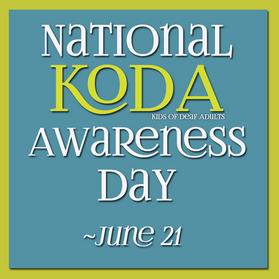BURBANK—On June 21, KODAWest will be celebrating National KODA Awareness Day. Canyon News spoke to 2 of the 3 women running KODAWest, Lisa Hermatz-Chahayed and Lauren Abbott Maucere about the upcoming event for more details. Chahayed works along side one other woman in maintaining KODAWest: Kavita Pipalia.
Chahayed told Canyon News that KODAWest has been “advocating and supporting KODAs since [the organizations’] inception in 2005.” The National Awareness day is fairly new; their first celebration occurring in June of last year.
The Awareness Day began with many appreciation days before KODA leaders and CODA (adult Children of Deaf Adults) International leaders discussed the idea of making the event an annual recognized day. When the leaders of KODA and CODA finished discussing matters, the day was to be celebrated on the first day of the summer solstice because many “kids [will be] enjoying the summer break, National KODA Awareness Day was established to enlighten the world about children who have Deaf parent(s),” Chahayed informed.
Maucere imagined celebrating National KODA Awareness Day in the future “just like we do with Mother’s Day and Father’s Day, we shed light on our KODAs and share how special and valued they are to us by posting pictures on social media sites, giving tokens of appreciation such as cards and ILYs and even wearing t-shirts that showcase their KODA pride…Our intention is to promote awareness of the KODAs more than anything and to communicate to them that they are just as much a part of the Deaf community as they are of the Hearing community. ”
Chahayed “[hopes the awareness day] will spread awareness across the globe, not only because the general public may not realize this ‘subculture’ exists, but MANY MANY KODAs do not realize that they are a special ‘breed’ of humans.. unique and awesome! Once they realize they are KODA’s they start to understand and accept their bi-cultural identities. They are raised by deaf parents in deaf households (where ASL is mainly used), but are taught in schools and integrated with hearing people (where spoken language is used), two very different cultures and means of communication.”
Maucere reflected the sentiment saying, “many cultures and communities are recognized, celebrated and cherished by people around the world. It is a wonderful way to acknowledge a group and shows that we embrace and value a certain entity. Why not the KODA community? At times, this group often do not feel like they belong to just the hearing community nor the deaf community because they are neither deaf through the ears, nor hearing through the eyes. They may hear, but they have deaf hearts. It is time that we bridge the gap between the hearing and deaf communities by celebrating this special, awesome population that has the best of both worlds.”
KODAWest, as well as other KODAs and CODAs want to “recognize that these children are a unique bunch, who need to be given tools to help them understand themselves, and to be able to explain and educate the world about themselves. Many of these children will grow into adulthood with a degree of identity struggles until they meet others like themselves later in life. Early intervention and exposure for these KODAs will help them grow into strong and confident individuals.”
Chahayed told Canyon News that though she hopes the event will become a special day that they will able to host annually, the current status of the National KODA Awareness Day is spreading the word via social media.
Chahayed acknowledged KODAWest’s success with a “hats off…for making it this far,” according to the KODAWest Facebook page. Friends and fans of KODAWest congratulated the women on their accomplishments with their activities and events within the organization.
She indicated that KODAWest hosts other events that aim to empower young KODAs such as their “one week camp [which helps] KODAs from across the nation understand their identities and empowers them to be strong individuals. We also have a mentorship program (Big CODA Little KODA) where we pair up older CODA role models with younger KODAs, who may not be old enough to go to camp, but need support and understanding.”
“90 perecent of Deaf parents in the world have KODAs…[they] are considered Third Culture Kids (TCK). TCK is a term that refers to anyone who grows up influenced by more than one culture, which creates a third culture.”
KODAs from different countries share some of the same experiences, Chahayed explained that KODAs have come to KODAWest events from places as far away as Hawaii, Canada, and New York; and even seeing Camp counselors arrive from as far away as Germany to participate in KODAWest activities.
Chahayed informed the Canyon News that “60% of the world’s KODAs are bi-cultural, bilingual and bi-modal.” Children who learn ASL before learning how to speak can be brilliant, A study in 1997 titled, A Study of the Relationship Between American Sign language and English Literacy , by Michael Strong of the University of California and Philip M. Prinz of San Francisco State University; the study explained that with the use of “a specially designed test of ASL to determine three levels of ASL ability, [they] found that deaf children who attained the higher two levels outperformed children in the lowest ASL ability level in English literacy, regardless of age and IQ.”






